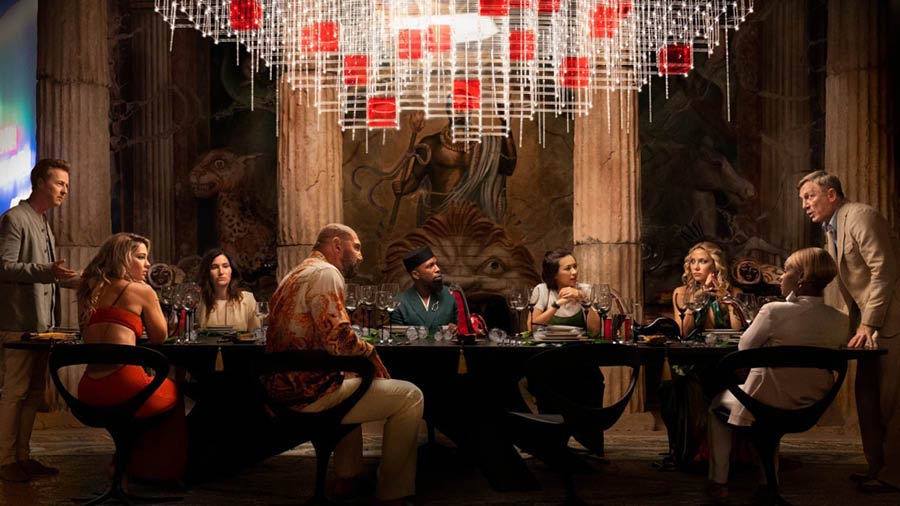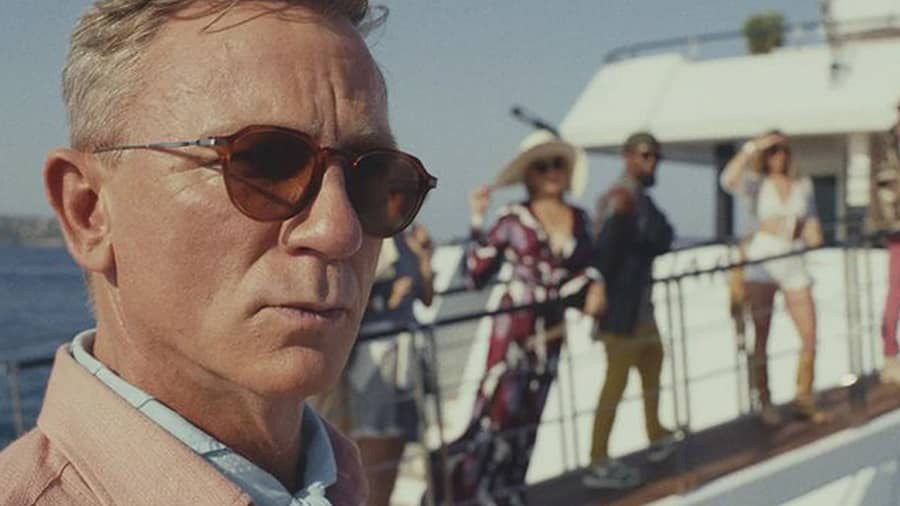Ever wondered what the ‘First Lady of crime fiction’, Agatha Christie, could stir up had she been around today? While the possibilities of Christie offering satirical murder mysteries in this day and age are one too many, for Knives Out franchise writer-director Rian Johnson, the homework has been neat and clever.
Taking inspiration from the great dame of detective stories, Johnson takes us on another Christie-esque whodunnit masterclass that subverts the classic tropes while paying homage to the same in Glass Onion, the second instalment of the Knives Out franchise, streaming on Netflix.
Just as we were busy manifesting the epic crossovers that come to us as gifts in the superhero multiverse, Johnson was busy taking notes to help concoct the ultimate detective. A detective imbued with the skillset and quirks of all the detectives we have loved before and presented with a refreshing return for Daniel Craig as Benoit Blanc (think James Bond on vacation!)
Reminders of Christie’s ‘Evil Under The Sun’ and ‘And Then There Were None’ are hard to ignore
Lo and behold, we have a detective genius with a Southern drawl, a name that is typically reminiscent of Hercule Poirot himself, paired with a sharp, puzzle-solving, detail-spotting mind a la Sherlock Holmes. In Glass Onion, Johnson takes Craig closer to his former James Bond avatar by making him rub shoulders with a tech-savvy Elon Musk-esque world.
Taking tradition further than the first movie, Glass Onion, shot during the pandemic period, trespasses even more meticulously on the Agatha Christie mysteries. From the dark indoors of a Massachusetts mansion in the first movie (Knives Out), we are transported to a luxurious Greek island with a wild array of colours basking on our screens. Reminders of Christie’s Evil Under The Sun and And Then There Were None are hard to ignore.
Much like the first novel, where Poirot finds himself vacationing in a fancy seaside resort, Johnson assembles a motley group of uber-rich “disruptors” on a secluded island (think And Then There Were None) under the Grecian sun to play a murder mystery game and places an apparently “uninvited” (again) Blanc amidst them all.
As far as the whodunnit genre goes, the seasoned audience is well aware of the clues and hints that are to be expected from a typical crime story. But Johnson’s mastery lies in betraying those expectations by subverting the tropes and being self-reflexive. Contrary to most detective stories, the Knives Out franchise believes in declaring the murders right from the get-go and there is a certain deadpan comic nature in which the sinister is expressed.
One’s expectations are betrayed, the game is apparently over even before it is afoot
In Glass Onion, we are told by Miles Bron (played by Edward Norton), the tech billionaire who invites his friends over to his island to play a murder mystery game, that he is the one who is supposed to die.
At one point, Blanc ridicules this in a crucial conversation with Miles, saying, “You’ve taken seven people, each of whom have a real-life reason to wish you harm, gathered them together on a remote island and placed the idea of your murder in their heads.”
What appears then to be just a silly mystery game turns on its head when every character, including the side players, is revealed to have actual motives for murdering Miles, leaving the audience on the edge of their seats, anticipating his murder.
A lot of painstaking effort is taken to build up to this “game” where Miles, a so-called maverick genius, will be killed. The audience is gradually looped in, only for Blanc to tug and unravel the mystery all at once. One’s expectations are betrayed, the game is apparently over even before it is afoot.
The anticipation we have for Miles getting murdered is never fulfilled but murder(s) do take place, causing the murder mystery game to become all too real, all too soon. Blanc, inevitably, finds himself in charge of peeling the layers of the literal and metaphorical Glass Onion.
Placed on the island where it is difficult to understand what is happening for real and what is make-belief, there is a memorably tragicomic moment where Kate Hudson’s supermodel character, Birdie Jay, cries out, “What is reality?”, refreshing memories of The Truman Show. A touch of postmodernism, anyone?
Glass Onion is ultimately yet another social satire posing as a murder mystery

There is little to trust in Glass Onion as the story progresses, with appearances becoming deceptive, as per old-fashioned crime drama charm. But the audience is never allowed to rest their “little grey cells”, as Johnson keeps bombarding (quite literally) them with twists.
Just like in a classic detective story, the viewer is allowed to suspect everyone and expect the detective to hog the limelight for an epic sit-down reveal in the closing minutes of the film. Johnson, however, will not let his Blanc be a party to this. The grand reveal, when it arrives, comes off as comic and wildly ironic, more so given the intricate build-up that precedes it.
Johnson lets Blanc do his sleuthing before declaring solemnly “there’s nothing I can do” and quietly exiting ahead of the denouement, unlike a typical Christie crime drama where Poirot is expected to linger. In Glass Onion, the baton is passed on to a victimised lead to take up all the light as Blanc is nowhere to be seen for the final shenanigans, subverting an age-old trope once again where the detective is not the one getting the claps and hoots for doing all the snitch work — Blanc remains far away from the chaos, watching it all unfurl.
Speaking about the film, Craig told The Guardian how Johnson imagined Christie of the present day would write: “Agatha Christie didn’t write historical novels, she wrote what was happening at the time. If she was writing now, there would be a tech billionaire. Her books are social commentaries, and they’re a good laugh. We all need a good laugh right now.”
And just like that, Glass Onion is ultimately yet another social satire posing as a murder mystery, saluting Christie while bringing alive the whodunnit genre in a subversive light. Through all the subtle digs Johnson takes at Musk (and his like) to hold up a literal glass mirror to the flaws of all his selfish yet vibrant characters, Glass Onion becomes both layered and transparent. We can see through it only if we have the vision to peel it apart, making the film a powerful example of Christie’s inspiration and its own subversive originality.










